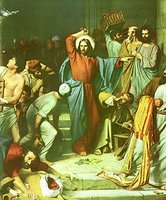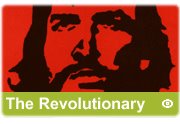Dellview Baptist Sermon on 3-12-06
The story behind the Scripture text (context): Jesus had just predicted his death (8.31-32) and Peter could not stomach the thought of his leader, the one whom he had abandoned all to follow, end up dead. The Scripture says that Peter took Jesus aside and began to rebuke him.
In my mind’s eye I imagine Peter feeling the need to take control of the situation. Peter, I imagine, grabbed Jesus by the arm and turned him away from the others and began to tell Jesus that he if he continued to speak this way that he would lower the moral and spirits of those who were following his lead . . . At that moment, I further imagine Jesus abruptly (in Peter’s mid-speech) turn and face all of his would-be disciples and say:
“Whoever wants to be my disciple must deny themselves and take up their cross and follow me. For whoever wants to save their life will lose it, but whoever loses their life for me and the gospel will save it . . .”
In my 7th grade Texas history class coach Lockhart, the class teacher, loved to tell Texas history stories. He told all of them with great imagination and passion. One of the lessons –or stories- was about young William Travis at the Alamo.
The situation for Travis and his patriots and comrades was ominous. Santa Anna with his mass Mexican army was ready to pounce and finally (they had already attempted two previous charges) destroy the strong stubborn defenders of the Alamo.
The next part of the story is either legend or history. On March 5, 1835, Travis realizing the fatal gravity of the moment gave charge and choice to all of his men; they could fight or flee; they could stay and die or try to escape to save their lives. The story goes, he drew a line in the dirt with his sword and invited all who would fight and die with him to cross that line. Various sources say that all but one or two crossed the line in the sand.
Travis’s line in the sand really is the stuff that Hollywood loves to dramatize and that history teachers capture their students’ sleepy attention spans. (i.e. Travis, William Wallace, Churchill, and Jesus! etc.).
Jesus’ invitation, his line in the sand, was also a call to courage and sure death for those who would follow him. Jesus never called his would-be followers to do any thing or go anywhere that he himself was not willing to do or go himself. It can never be said that Jesus sweet-talked anyone to follow him, instead he invited, “deny yourself, take up your cross and follow me.”
I must admit most of the time when I think of Christ speaking to me or when I speak on his behalf to others, I am most often reminded of Jesus’ other invitation found in Matthew 11.28:
“Come to me all who are weary and burdened, and I will give you rest. Take my yoke upon you and learn form me, for I am gentle and humble in hear, and you will find rest for your souls . . .”
So which invitation is it (Matthew 11.28 or Mark 8.34)? It is both. Sometimes we’re weary and faint and need the sustaining and reviving life grace of Christ (Matthew 11.28); and other times, in our life, we need to count the cost and choose which side of the line we will stand and fight on (Mark 8.34). Moreover, the context of Matthew 11.18 was that of an initial personal (come to me) and salvation relationship with Christ and in Mark 8.34 the context is discipleship and ongoing commitment (whoever wants to be my disciple). The context of the calling has everything to do with the invitations that we hear from Christ. Both callings, nevertheless, are true.
The context of Mark 8.34 was that those in earshot of Jesus had to make up their mind. Christ was being quite frank and honest with them; he had just told them very plainly how things were going to play out. Peter quickly made the inference and objected. After all Peter signed up for the cause of Christ, which in his mind (perhaps) was life and freedom for his country and family from the tyranny of Rome and Gentile culture. He did not sign up to die in defeat; he wanted his life to count, he didn’t want or his leader to die a criminal’s cursed death on a cross.
Jesus’ ways are always backwards compared to the logic and ways of this world and often our minds. What Peter and so many would-be followers don’t realize that by such willingness to deny one’s self and die for the sake of Christ and his message is the very way to life, freedom, and victory.
*Jesus said to his would-be followers, “deny [yourselves].”Such self-denial is equally hard for the modern day would-be disciple. Jesus often spoke in such ways: “Anyone who wants to be first must be the very last, and be the servant of all.” (Mark 9.35) And, “whoever wants to save their life will lose it, but whoever loses their life for me and the gospel will save it . . .”
We live in an age and time where being first, winning, succeeding, accomplishing, and triumphing is the admirable and relished position.
In our individual lives we strive to get ahead of others in school, the work place and even in church.
Many buy into the self-succeeding and self-securing at all cost lifestyle as the apex of ultimate meaning and purpose of living this life. Individually we hold on tightly and try to run further, faster, and harder than all of those we are competing against. We live in a world that teaches and sells self-advancing and self-winning as the primary significance in all of one’s life.
But Jesus teaches that real selfhood, self-identity, and meaning is only found when we stop holding on to our life so tightly and let go. But we want to win so badly and it’s hard to let go and fall effortlessly in to the arms of God. And yet we only truly win when we give in to God . . . But we want to keep control of the situation like Peter (Mark8.32).
Jesus told of another individual that such self-denial proved to costly:
“ . . . a man came running up, greeted him [Jesus] with great reverence, and asked, ‘Good teacher, what must I do to get [we want to win!] eternal life?’ Jesus said, ‘ . . . You know the commandments: Don’t murder, don’t commit adultery, don’t steal, don’t lie, don’ t cheat, honor your father and mother.’
He said, ‘Teacher, I have- from my youth- kept them all!’ Jesus looked him hard in the eye- and loved him! He said, ‘There is one thing left: go sell whatever you own and give it to the poor. All of your wealth will then be heavenly wealth. And come follow me.’
The man’s face clouded over. This was the last thing he expected to hear, and he walked off with a heavy heart. He was holing on tight to a lot of things, and not about to let go.” (Mark 10.17-22)
Self-denial is hard. Where in your life is self-denial an obstacle to following Christ?
*Jesus said to his would-be followers, “take up your cross.”The mention of taking up a cross was a death sentence. For all in earshot of Christ that day (historical context), they herd Jesus say that if they chose him they where choosing death. What is the significance of taking up our cross in our day? We may not be asked to physically die for our faith (this day and age), but we would-be followers (transcending all times) are always asked to fully live out our faith.
Dietrich Bonhoeffer, “
When Christ calls a man he bids him come and die.”
Would you be willing to die for Christ and his message?
You have to first be willing to fully live for Christ and his message.
*Jesus said to his would-be followers, “follow me.”
I herd a quote from Richard Rourke (?) that I’ve been pondering these last few weeks; that is that
Jesus never called upon people to worship him . . . he called on people to follow him! Where is Christ leading you today? Where is he leading this church? Following Christ is always costly and sacrificial.
Are we (individual and as a church) willing to follow him at such an expense?



